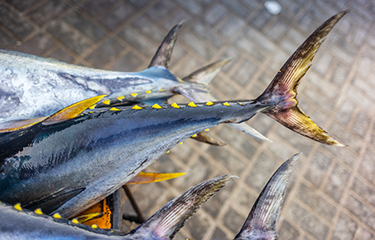The Indian Ocean Tuna Commission adopted an overall catch reduction of around 10 percent on yellowfin tuna at its annual meeting in Hyderabad, India, last week.
The environmental non-governmental organization Blue Marine Foundation was one of several NGOs to criticize the move as not going far enough to prevent a collapse of yellowfin stocks in the Indian Ocean.
“By ignoring the advice of their own scientists, the Indian Ocean Tuna Commission has once again demonstrated that it is one of the most dysfunctional [United Nations] institutions and desperately in need of reform. The member nations should be sharing the pain of catch reductions made necessary by their incompetent management, rather than avoiding it and making stock collapse more likely,” Blue Marine Foundation Executive Director Charles Clover said. “The [European Union] continues to help itself to a share of the catch that is against its own regulations and the U.N. Law of the Sea. Retailers now need to step up and ask questions about the adverse influence of processors such as Princes and John West and nations guilty of illegal and excessive fishing such as Spain.”
The foundation also critiqued the IOTC’s reliance on voluntary compliance with its recommendations.
Other NGOs, including the International Seafood Sustainability Foundation, The Pew Charitable Trusts, the Sustainable Fisheries Partnership, the World Wildlife Fund (WWF) The Earthworm Foundation, and Ocean Outcomes had called for a 25 to 30 percent reduction from 2017 catch levels.
“The Indian Ocean Tuna Commission has flunked the most important decision of its meeting: to cut fishing pressure on yellowfin tuna in line with scientific advice,” Callum Roberts, a professor of environment and geography at the University of York (U.K.) and an advocate for reform in the fishing industry, said. “By adopting a token 10 percent reduction in quota, justified by a longer period for tuna recovery, they risk further decline of the stock and long-term economic misery. Such blatant mismanagement, played out year after year, will lead to the closure of the fishery when the inevitable collapse comes.”
The new total allowable catch will be in effect through 2027.







